Trending
Opinion: How will Project 2025 impact game developers?
The Heritage Foundation's manifesto for the possible next administration could do great harm to many, including large portions of the game development community.

Featured Blog | This community-written post highlights the best of what the game industry has to offer. Read more like it on the Game Developer Blogs or learn how to Submit Your Own Blog Post
An examination of the writing and narrative design in Arkane Studios' stealth action game "Dishonored": where it went wrong, where it could have gone better, and where it went oh so right.

A few months ago my brother asked me if I'd recommend Dishonored, to which I offered a half-hearted non-answer spilling with conditional clauses. Right now? I've finished the game four times and I still want to go back. It's safe to say I've had a change of heart.
Many have reviewed the game as a whole by now, months after its release. But I want to take a closer look at just one part. The following is my take on the game's writing: where it went wrong, where it could have gone better, and where it went oh so right. Fair warning: spoilers abound!
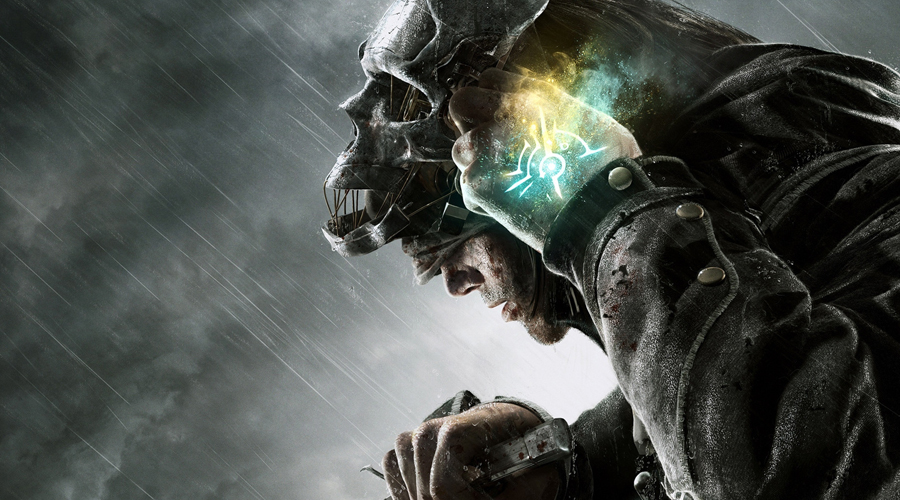 Dishonored | Arkane Studios | Bethesda Softworks
Dishonored | Arkane Studios | Bethesda Softworks
1. "THE BEGINNING" or "THAT WHALE LOOKS MIGHTY UNCOMFORTABLE"
In the opening moments, a bright silvery day greets us at sea as Lord Protector Corvo Attano completes his voyage home. But whether it's Curnow's exchange with the boat's pilot about a supposed curse, or the peculiar City Watch guard staring dead at us from another boat as we pass by, or even the whaling ship that looms behind him with a dead leviathan hanging from its masts, one thing becomes clear: Something Is Rotten In The State Of Dunwall.

Dishonored Dunwall Rotting
And the stench is everywhere.Developers (herein referred to as 'devs') did a great job of balancing brevity with exposition. We aren't made to sit through a drawn-out explanation of peace times. The environment already tells us things have been pretty good: clear skies, clean waters, a quiet in the air. We are instead thrown into an impending change, a foreshadowing. This is how we're hooked in.
The prologue also apprises us of what's at stake for Corvo, cluing us in to his closeness with Empress Jessamine and her daughter Emily. But the train stops at sympathy. A decade-long love affair with Jessamine, playing father to Emily, right through six torturous months in Coldridge Prison -- they all pass us by in minutes. We may feel slighted by the obvious villain, Spymaster-turned-Regent Hiram Burrows, but while Corvo's heart seethes with vengeance, we're really only along for the (incredibly fun) ride. Ludonarrative dissonance? Gesundheit.
2. "MOTIVATION" or "I LOVED YOU MY DEAR WHATS-HER-NAME"
Don't get me wrong; devs made the right choice to prioritize getting players into the action as soon as possible. Needs of the game, it is said, should always trump needs of the story -- and rightly so. But later measures could have been taken to diminish this gap between player and avatar goals.
One way would be to highlight Corvo's loss. Similar to the Outsider's visits, why not have Corvo dream of Jessamine and their shared moments from time to time -- moments that inform the gravity of the retribution he wishes to exact on his targets? I don't mean something obviously romantic or saccharine. Unearthing the subtle undercurrents of their relationship would be a mistake; this understated portrayal was deeply moving. But the more interactions we see between them, the more we can start to care in whatever capacity we might imagine, and the more we come to despise the Burrows regime.
The dreams themselves would be playable but skippable, much like the mission dialogue. We'd need nothing but a series of vignettes. Perhaps a touch of the arm after a meeting of the four Isles' heads of state; a smile \when she glances at Corvo with Emily, as Sokolov paints her portrait; a masked stroll through town during the Fugue Feast where they act like a common nuclear family.
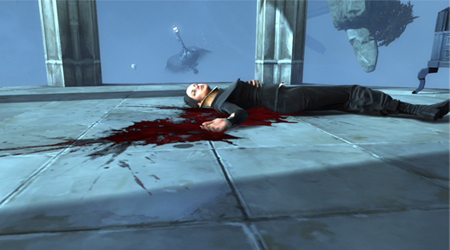
Dishonored Empress Slain
Then she is taken away.It could also have been effective to extend the assassin's assault. Let us desperately defend the Empress for another half- or full minute, and let us believe we can really keep her safe, if only just -- until our bullets run out or our sword shatters from battle. Too soon are we helplessly tethered to the wall with our agency robbed. If we had a tactile and experiential sense of our duty as Lord Protector, we would feel more responsible for failing to protect her.
3. "THE VILLAIN" or "A GREAT GUY TO HANG OUT WITH DURING NEVER"
Another way would have been to make the Regent even more deplorable, uniting Corvo and the player in hatred. But the game presents Hiram Burrows as enough of an irredeemable 'bad guy' -- or indeed does so too much. When we learn of his Poverty Eradication Plan, even his noble desire to see a prosperous Gristol remains inextricably bound to the blatant disregard for the lives of the poor. Ingredients: 100% antagonist.
Thankfully, a one-dimensional rendering does not detract from the visceral joys of assassination. Yet I can't help but wonder though: as gratifying as it is to goad the Lord Regent through a rewired Wall of Light in his own safe room, or to jab a sword through the necks of the bullying Pendleton twins, would antagonists with more depth have made it even more so?
Imagine a Lady Burrows (a wife) sitting at the dinner table with Hiram having a silent meal. Tasked with assassinating him in his own home, you sit perched in the ceiling corner waiting for her and the maids to clear the room. You already know he's having an affair with Lady Boyle. You know what kind of man he is. But just as you're about to jump down, a boy the same age as Emily walks in -- a boy who calls Hiram "Father." The Regent acts stern with the boy, a bit distant perhaps, but he talks to him still, obviously invested in his heir's future. The boy even looks like his father. Suddenly, the folding blade in your hand feels heavy.
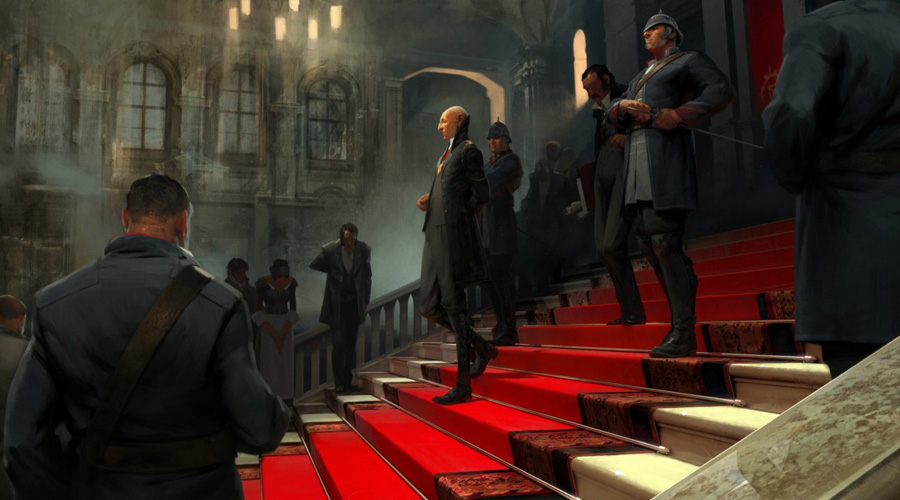 But all we see is a bald, skinny tyrant in a fortress of steel, guns, and guards
But all we see is a bald, skinny tyrant in a fortress of steel, guns, and guards
Now imagine what methods you could use to bring about the Regent's fall.
4. "THE HERO" or "DIFFERENT WAYS TO DEAL WITH TRAUMA"
Our protagonist demonstrates incredible versatility in supporting any playstyle adopted by players, be it non-lethal ghost, rat vortex of plague death, or a variant. We can believe Corvo loses his mind in bloodlust after the Empress' murder, and we can believe he chooses to uphold her respect for life as he fights to bring Emily to her mother's throne. It's a role-playing ideal. Players retain their freedom while Corvo's established character stays coherent. Staying silent in spite of having a well-established backstory was odd, but somehow I readily accepted it.
My greatest disappointment with Corvo was how we never see him in action. His character design is hands down the best in the game. But not only is he without shadow; he is also mostly without form. The game benefits immensely from being first-person, but I just wish we could have somehow seen him in person. Reflections, maybe? Kill-cam POV shift?
5. "THE CAST" or "SUSAN SARANDON IS IN A GAME"
It's no secret that Dishonored has some incredible actors lending their voices to the citizens of Dunwall, but it's criminal how rarely they're used to the fullest extent. Admiral Havelock spends most of his lines disseminating quest information, relegating John Slattery to a mostly charmless and dull version of Mad Men's Roger Sterling. Derek Phillips falls to a similar fate, but at least gets to show some damn emotion when Treavor Pendleton yells at Wallace while taping his 'memoirs'. Too many others sound like they're on antidepressants.
On the other hand, Granny Rags' appearances always brought me delight. Susan Sarandon did a marvelous job voicing her, though the 'barks' we hear during the final battle can sound a bit strained. Brad Dourif works magic with the flawed philosopher Piero Joplin, but variations of "Can I make something for you?" ran long at times. The actor isn't afraid to take his time with a sentence, and sometimes that was put at odds with player impatience. Sometimes I just want to buy some darn sleep darts, all right?
Still, our 'allies' in the Hound Pits sound mostly robotic. The range of emotions we hear isn't the most expansive. It fits Billy Lush's rendition of The Outsider, but little else. If you do want to hear the actors come alive, I highly recommend a High Chaos playthrough. The best performances of the game hide in that last chapter and it was music to my ears.
6. "THE TURNING POINT" or "THERE'S A KNIFE IN MY BACK BUT IT DOESN'T HURT"
A central structural flaw in Dishonored's plotline was the straightforward progression of events. Before the Loyalists sell Corvo out, everything goes exactly according to plan. So when the 'twist' finally came, I was already expecting something to go wrong. Where were the red herrings to lead me astray?
What bothered me more was how little it seemed to matter. True, there were enough hints to suggest that these people may not be trustworthy. The problem was that there wasn't much trust to begin with. Or can we forget that the self-named Conspiracy condones blackmail and assassination? A proper reversal requires a false expectation before it has any weight.
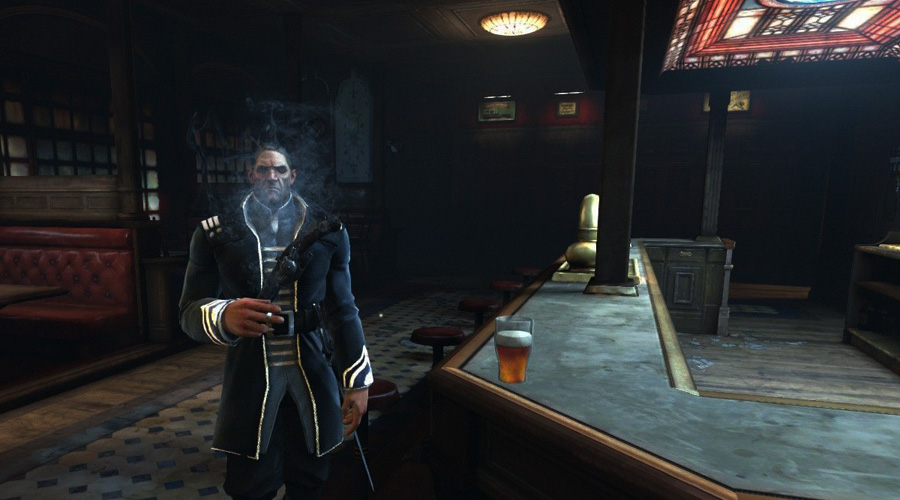 Is this the face of someone you could trust?
Is this the face of someone you could trust?
Here's an idea. It's commonly known that touch can establish trust. This is why business deals and playground apologies involve handshakes, why we pat each other on the back, why we lay a hand on another's shoulder. We're connecting. Apart from Emily, only the Admiral ever touches you in all of Dishonored, and only the one time after rescuing Emily from the Pendleton twins.
The scene struck me as odd. Here was a moment with real subtext, but it was uncharacteristic -- an inconsistency. Corvo holds Emily's hand in a fatherly way as she steps towards her new home at the Hound Pits, and Havelock moves in for a handshake. More moments like this would have been great; suppose the Loyalists would shake your hand when you killed none, but favored a different gesture when you had blood on your hands.
7. "THE CHARACTERS" or "WHO?"
At first glance, the characters we meet do appear one-dimensional. But you can find a 'second dimension' with some patience. Using the Heart on them, talking through their randomized cycle of dialogue lines, and meticulously checking for audiographs reveals Calista's hidden desire to be a free whaler, Treavor Pendleton's two-track mind of murder and Waverly Boyle, Farley Havelock's lost brother juxtaposed with his bloodlust, and even Teague Martin's criminal past.
These revelations fall a tad short of astounding, but it does pull the cast a few grades higher in depth. Devs took time to furnish their characters with history and traits; it was just folded behind the facade of the critical path. There is, however, an extraordinary exception, but it surprisingly isn't Granny Rags. She numbers fourth among the most well-rendered characters, I'd say, but still lacks a coherent worldview outside her insanity and backstory.
No. The exception is Daud.
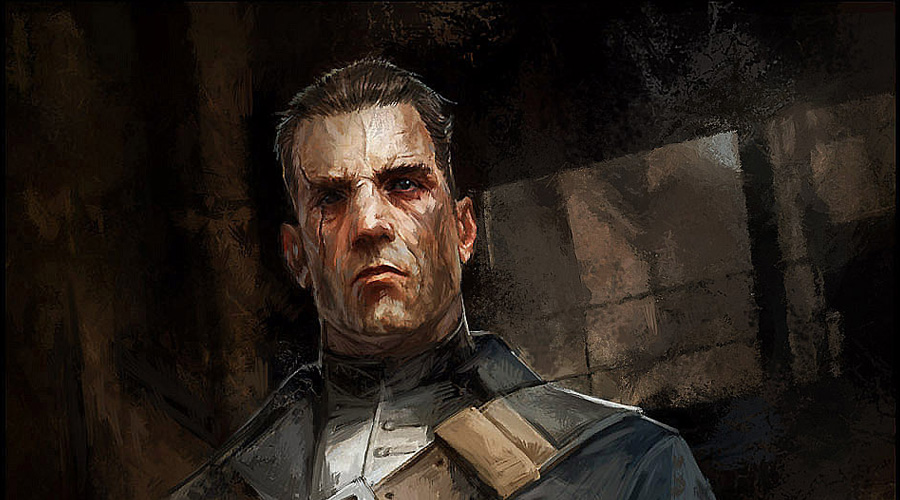 Ego homini Lupus
Ego homini Lupus
We've known of his existence since the game's opening moments, and his presence permeates throughout all the levels. No silly one-liner, no maniacal laughter. He spoke only with silent steel through the Empress' heart. And in a sea of remorseless villains, his anguish over killing Jessamine took me by blissful surprise. What's more is that confronting Daud leads to one of the greatest moments of storytelling in the game -- maybe even of recent memory.
As he kneels before you after the duel, bloodied and beaten, he begins a confession that haunted me to the bone. Suddenly the parallels between he and Corvo go far beyond sharing the same homeland of Serkonos or having supernatural powers. He was once just a boy with fast hands, taken from the playground against his will to be trained. Yet here was a man who the Outsider said would make a difference -- just as he had to us -- but who lived to regret everything he had ever done because of it.
In the end, Daud was nothing more than a sword for hire doused with the blood of his prey and the gold of his benefactors. Was Corvo truly any different to the Loyalists? Your whole journey becomes suspect. The path you tread has been walked by this fallen ghost before you, and someday you might walk his. With your blade drawn to the old assassin's neck, a vision of the future comes over you. And it's darker than any plague. Is this what you will be, or is this what you've already become?
Thank you, Arkane. Thank you for this absolutely beautiful moment.
8. "BRANCHING NARRATIVE" or "THE MANY LIVES OF CORVO ATTANO"
Apart from the many, many, many ways we can approach each level (an absolute thing of beauty), the dev team also took the time to endow our decisions with palpable consequences. Chief among these is that the price given our vengeance: Emily's innocence. I'm reminded of her chilling last line before the ending, atop the stormy Burrows Lighthouse: "I was going to have them all killed anyway."
While the Chaos meter grants great replayability, the drawback falls to tension. Playing Low Chaos still provides a good challenge, but folks are in better spirits, the plague seems less dire, and Kingsparrow Island glows with the same silver daylight as Dunwall Tower in the prologue. The plotline still stands up as a whole, but urgency -- and possibly even tone -- takes a dive.
Disturbing as it is to find Martin and Pendleton already dead at Havelock's hands (matched with something from a horror soundtrack), seeing them at each other's throats in High Chaos is a far superior third act, more consistent with the story's overall tone and befitting of the three men's downward-spiraling arcs. This was a true betrayal. Even though it didn't involve Corvo, I cared about it so much more because the Loyalists had sworn their blood oaths -- they had that basis of trust to be corrupted, and its dissolution absolutely deserved to happen on-screen.
A part of me wants the worst ending to become canon in the Dishonored sequels. Gristol crumbles and Corvo disappears, just another link in the chain of people touched by the Outsider and fallen to ruin. Maybe we'll meet him again; a shadow of a fool somewhere between Vera Moray and Daud. A bleak outcome, yes, but so very delectable.
9. "THE COMPANION" or "WHY DID YOU MAKE ME DO IT!?"
I neglected to mention another extraordinary character in this game besides Corvo and Daud. Devs demonstrated supreme finesse in building up this character. They made sure that whichever payoff you get in the final level, it will leave a lasting impact on you. Who else, but one Samuel Beechworth?
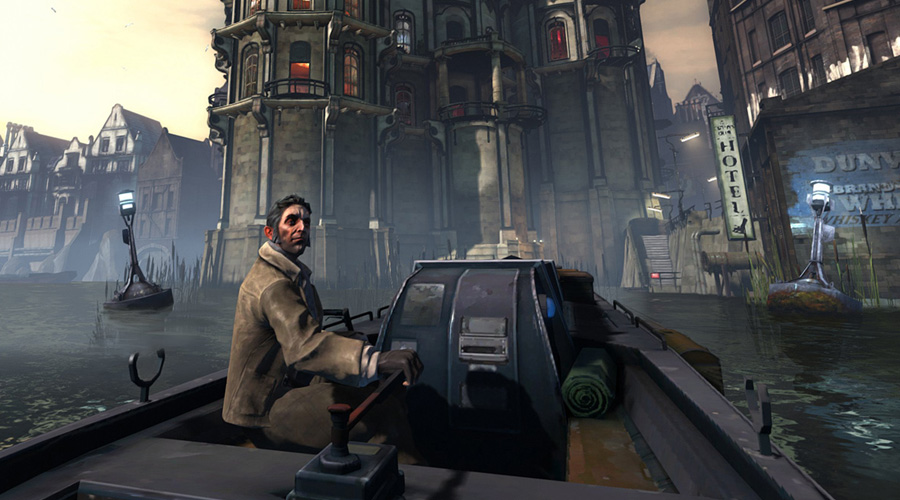 Where everybody knows your name
Where everybody knows your name
That Samuel's respect was worth any emotional currency is a sign of great game writing and great game design. In Low Chaos, we feel validated when he commends us for staying true to who we are, in spite of the world's darkness. In High Chaos, we are either subjected to the most gut-wrenching betrayal of all, or we thoughtlessly kill one of the few good men left in Dunwall just to protect our precious cover.
I felt so small and childish when I did it. Stealth was this toy I had played with the whole game, and in that moment I valued it more than this man's life.
I'm torn between Samuel and Daud for 'Best NPC of Dishonored', as both inspired profound moments of reflection. Samuel's backstory as a sailor who willfully forgot a lost love is simple but effective. The dev team's true genius, however, shows in how we're made to trust and care about Samuel. It astounded me that although he fed me poison, all I can think is how he spared/saved my life. I now know how this was done.
Think about all the times we see Samuel. In many of these scenes, we've just come out of a hostile zone to find our way to safety with the ever-patient boatman. In our dark tunnels, he represents The Light At The End. Other scenes have Samuel offering us useful hints and reminding us to be careful as he ferries us to our destination. While the Admiral barks orders and sends us away, Samuel is with us down in the trenches, a comrade in arms. Reuniting with him after each level signals victory. We're safe. We're alive. And we're going home.
10. "DUNWALL'S WORLD FICTION" or "THESE PEOPLE REALLY AREN'T VERY NICE"
Perhaps the reason why Samuel's kindness truly shines stems from the harshness of the setting. The Isles never fail to remind us of the fact that men slaughter whales with unbelievable cruelty, cutting away at their flesh while they still live. I would have loved to walk through a slaughterhouse in one of the levels to see the heights of Dunwall's inhumanity. The Overseer selection process, as well, involves a chance of death for little discernible reason, ironizing their disdain for Outsider worship which is comparatively tame. And though sentries may "gather for whisky and cigars" each night, their attitudes toward the sick and rival faction members mirror the Regent's: 'everyone poses a threat.'
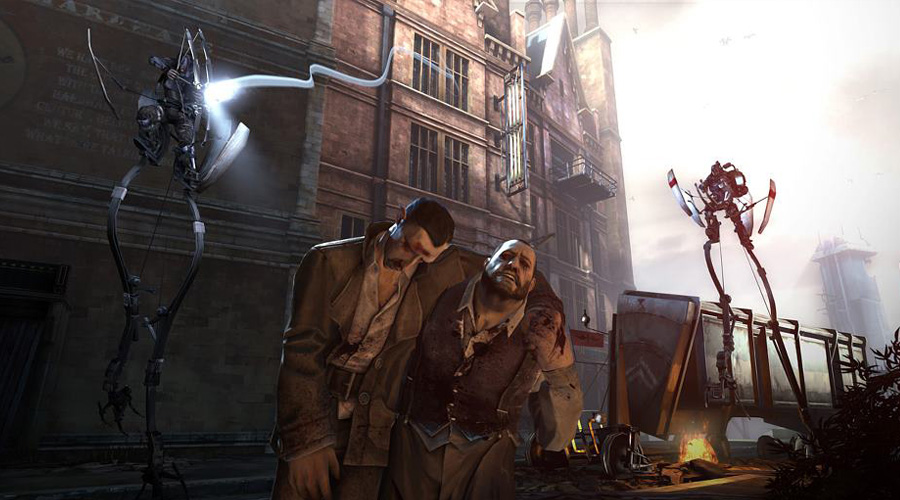 The rat plague turns the sick into zombies, and the rest become a little less human
The rat plague turns the sick into zombies, and the rest become a little less human
Audiographs, environmental elements, and world-expanding books add wonderful detail, depth, and color to Dunwall. But even though the lengths of the books we find in Dishonored pale in comparison to those in, say, Skyrim, their disruption of the game's flow is still not eliminated, only reduced.
That said, I didn't find this to be much of a problem. Those interested in reading need only seek the extras out while the rest can ignore them altogether, even if it is counter-intuitive to the game's emphasis on information gathering. Some books could have been turned into more audiographs, an effective if overused alternative for disseminating hints or fiction that doesn't interrupt gameplay. Then again, audiographs appear to be a kind of luxury item in the world.
IN CLOSING
The protagonist's idiosyncratic muteness weighs against the versatility of his development as either killer or ghost. A cast of simple characters surrounds a few shining exceptions. Dialogue (which I didn't really discuss above) too rarely veers away from straightforward plot advancement, but when it does the moments shine. Empathizing with Corvo's emotional state was difficult, but we're nevertheless immersed into visceral stealth and/or assassination play. All in all, I think Dishonored's strengths far overshadow its weaknesses.
In the end, my biggest criticism is that the game hides most of its complexity. But maybe that's how it's supposed to be. They say that one of the hardest lessons in game writing is learning that players aren't there to experience the grand genius of your dialogue or scene construction or plot ingenuity. Players enter a game to make their own legends. If one such tale involves the fastest way to reach the target, then Corvo the Fleetfoot Shadow it shall be. If another entails finding 'ironic' ways to kill targets, then Hipster Corvo prevails. It's senseless to force folks through narrative if they don't want it. Games must allow players to shape their own experiences within them.
Read more about:
Featured BlogsYou May Also Like